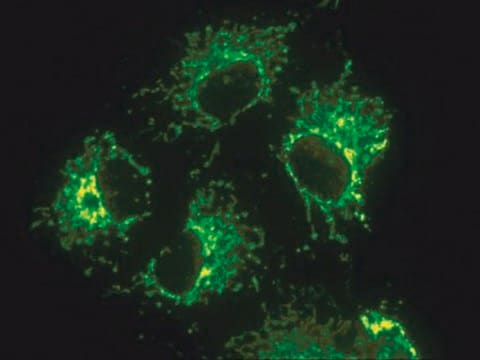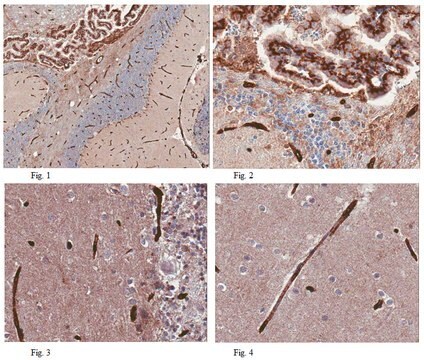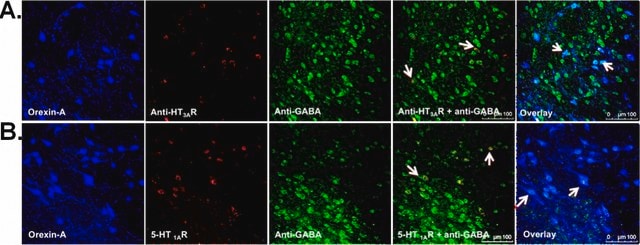AB5020
Anti-Glycine (Low Glutaraldehyde) Antibody
diluted serum, Chemicon®
Se connecterpour consulter vos tarifs contractuels et ceux de votre entreprise/organisme
About This Item
Code UNSPSC :
12352203
eCl@ss :
32160702
Nomenclature NACRES :
NA.41
Produits recommandés
Source biologique
rabbit
Niveau de qualité
Forme d'anticorps
diluted serum
Type de produit anticorps
primary antibodies
Clone
polyclonal
Espèces réactives
rat
Fabricant/nom de marque
Chemicon®
Technique(s)
immunohistochemistry: suitable
Conditions d'expédition
wet ice
Modification post-traductionnelle de la cible
unmodified
Catégories apparentées
Spécificité
Glycine. The antibody has been calibrated against a spectrum of antigens to assure hapten selectivity and proper affinity. No measurable cross-reactivity (<1:1000) against glycine in peptides or proteins. No measurable glutaraldehyde-fixed tissue cross-reactivity (<1:1000) against L-alanine, gamma-aminobutyrate, 1-amino-4-guanidobutane (AGB), D/L-arganine, D/L-aspartate, L-citrulline, L-cysteine, D/L-glutamate, D/L-glutamine, glutathione, L-lysine, L-ornithine, L-serine, taurine, L-threonine, L-tryptophan, L-tyrosine.
Immunogène
Glycine-glutaraldehyde-BSA
Application
Detect Glycine (Low Glutaraldehyde) using this Anti-Glycine (Low Glutaraldehyde) Antibody validated for use in IH.
Immunohistochemistry using silver-intensified immunogold or fluorescence (see recommended protocol). Samples should be fixed with 0.5% - 2.5% glutaraldehyde for optimum detection.
*This antibody has also been used and found to work with a zero-low glutaraldehyde / high paraformaldehyde fixation (4% paraformaldehyde in 0.1M phosphate buffer / 3% sucrose fixative). The minimum glutaraldehyde concentration for AB5020 is 0.05%. See protocol that follows. Performance is good with frozen sections, Vibratome sections and tissue culture formats, when penetrating reagents such as 0.3% Triton X-100 are used.
Optimal working dilutions must be determined by the end user.
DILUTION: Prepare enough of the AB5020 for your days use by diluting 100X with 1% GSPBT.
*This antibody has also been used and found to work with a zero-low glutaraldehyde / high paraformaldehyde fixation (4% paraformaldehyde in 0.1M phosphate buffer / 3% sucrose fixative). The minimum glutaraldehyde concentration for AB5020 is 0.05%. See protocol that follows. Performance is good with frozen sections, Vibratome sections and tissue culture formats, when penetrating reagents such as 0.3% Triton X-100 are used.
Optimal working dilutions must be determined by the end user.
DILUTION: Prepare enough of the AB5020 for your days use by diluting 100X with 1% GSPBT.
Research Category
Neuroscience
Neuroscience
Research Sub Category
Ion Channels & Transporters
Ion Channels & Transporters
Conditionnement
2000 assays
Forme physique
IgG fraction in sterile 0.1M phosphate buffer. No preservative
Stockage et stabilité
Maintain stock at 2-8°C in undiluted aliquots for up to 6 months. This stock is extremely stable under normal use and routine storage at 2-8°C. Do not freeze this stock.
Informations légales
CHEMICON is a registered trademark of Merck KGaA, Darmstadt, Germany
Clause de non-responsabilité
Unless otherwise stated in our catalog or other company documentation accompanying the product(s), our products are intended for research use only and are not to be used for any other purpose, which includes but is not limited to, unauthorized commercial uses, in vitro diagnostic uses, ex vivo or in vivo therapeutic uses or any type of consumption or application to humans or animals.
Vous ne trouvez pas le bon produit ?
Essayez notre Outil de sélection de produits.
Certificats d'analyse (COA)
Recherchez un Certificats d'analyse (COA) en saisissant le numéro de lot du produit. Les numéros de lot figurent sur l'étiquette du produit après les mots "Lot" ou "Batch".
Déjà en possession de ce produit ?
Retrouvez la documentation relative aux produits que vous avez récemment achetés dans la Bibliothèque de documents.
Optogenetic perturbation of preBotzinger complex inhibitory neurons modulates respiratory pattern.
Sherman, D; Worrell, JW; Cui, Y; Feldman, JL
Nature Neuroscience null
Franz Weber et al.
Nature, 526(7573), 435-438 (2015-10-08)
Rapid eye movement (REM) sleep is a distinct brain state characterized by activated electroencephalogram and complete skeletal muscle paralysis, and is associated with vivid dreams. Transection studies by Jouvet first demonstrated that the brainstem is both necessary and sufficient for
Nadia Parmhans et al.
The Journal of comparative neurology, 526(4), 742-766 (2017-12-09)
We report the retinal expression pattern of Ret, a receptor tyrosine kinase for the glial derived neurotrophic factor (GDNF) family ligands (GFLs), during development and in the adult mouse. Ret is initially expressed in retinal ganglion cells (RGCs), followed by
Lisa Nivison-Smith et al.
The Journal of comparative neurology, 521(11), 2416-2438 (2013-01-26)
Kainate receptors mediate fast, excitatory synaptic transmission for a range of inner neurons in the mammalian retina. However, allocation of functional kainate receptors to known cell types and their sensitivity remains unresolved. Using the cation channel probe 1-amino-4-guanidobutane agmatine (AGB)
Lisa Nivison-Smith et al.
PloS one, 8(3), e58406-e58406 (2013-03-22)
Lampreys are one of the two surviving groups of the agnathan (jawless) stages in vertebrate evolution and are thus ideal candidates for elucidating the evolution of visual systems. This study investigated the retinal amino acid neurochemistry of the southern hemisphere
Notre équipe de scientifiques dispose d'une expérience dans tous les secteurs de la recherche, notamment en sciences de la vie, science des matériaux, synthèse chimique, chromatographie, analyse et dans de nombreux autres domaines..
Contacter notre Service technique







